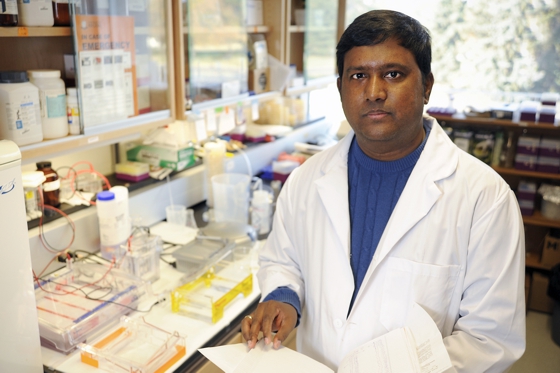A biochemist at the University of Regina is receiving government funding for his work in developing testing for COVID-19 through saliva, which could provide results within minutes.

“The most common way we test for COVID is to use an invasive nasal swab, but this technique doesn’t always provide an accurate diagnosis,” said Mohan Babu, a University of Regina researcher.
Babu is receiving the funding through the Canada Foundation for Innovation’s (CFI) Exceptional Opportunities Fund, according to the university’s website. He said he found out the news last week.
In total, Babu received $200,000 for his research, which is focused on peptide therapeutics. He said this uses certain molecules called peptide inhibitors, which can block the virus from entering the human host.
“These peptides are randomly generated and the rationale here is that the virus cannot recognize the peptides in any way,” Babu said.
“We know a portion of the peptides will bind to the spiked protein of the virus and the idea is that the peptides will block the entry of the virus, so that the binding to the H2 receptor will be inhibited.”
Babu said that once this happens, the virus also can’t replicate itself.
“This is the overall strategy of the anti-viral therapeutics,” he said.
- Ont. First Nation calls for chemical plant to be shut down amid ‘dangerously high’ benzene levels
- Ottawa looks to launch national flood insurance program within 12 months
- Nova Scotia scraps spring bear hunt idea, public ‘very divided’ on issue
- Ecuador rations power, declares emergency as drought limits hydro output
The biochemist went on to say that the researchers have generated a lot of peptides, screening between 50 and 60, and have had a positive hit.
He added they have also repeated the work several times because there are different strains of SARS-COVID-2, the coronavirus that causes COVID-19.
“The next step is to test them in mice… see if there’s no toxicity from the peptides,” Babu said.
Given the recent surge in Saskatchewan cases, there is also a diagnostic component, which Babu said is important. He says there are a lot of diagnostic kits out on the market and he is hoping to create one that is mobile and easy to use at home.
“The saliva (test) is a non-invasive technique. You don’t need to have a nurse or anybody standing next to the patient,” Babu said.
“Many people in the U.S. are already doing this kind of salivary-based diagnostic testing.”
In a press release, the university said Babu’s research could be an important piece of the puzzle that could help protect people’s health in Canada and across the globe.
“CFI is supporting the University of Regina-led work that may soon be able to contain the virus within our bodies and to develop a non-invasive, sensitive, rapid, low-cost diagnostic platform for mass screening,” said Dr. Kathleen McNutt, the university’s vice-president of research.
“Dr. Babu is part of a phenomenal worldwide effort to better understand, treat, and eventually contain the coronavirus.”






Comments